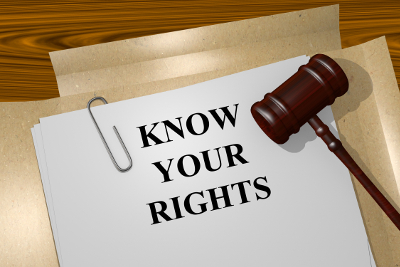Every police show on TV these days show a police officer arresting a criminal suspect; reading them their rights, also known as Miranda Warning. These constitutional rights, as decided by the United States Supreme Court in Miranda v. Arizona, gives the criminal suspect the right to remain silent and the right to an attorney. So how do you assert these rights? Let’s talk about that.

Right to remain silent
The first part of the Miranda Warning is to let you know that you have the right to remain silent, and that anything you say can be used against you in a court of law. Just remaining silent is actually not enough. You must actually tell the person asking you questions or detaining you that you invoke your right to remain silent. The person that you are telling this to must know without a doubt that you do not wish to speak to them about this issue. There cannot be any guesswork in your assertion. All you have to say is “I invoke my right to remain silent.”
This will only temporarily stop the interrogation process. The investigator, district attorney, or other government official may come back in 30 minutes, 24 hours, or 2 weeks from the time you invoked your right, and you have to assert the right again. If you do not, they can use whatever you said against you.
Right to an Attorney
There are two parts to this one. You have the right to talk with and have your attorney present for questioning, and if you cannot afford one, the court will appoint you one before any questioning. This means that you can either call your attorney and ask him to come to the location you are being held for questioning, or you can ask the court to appoint you a public defender if you do not have the finances to pay for one.
When asserting this right, it must be unequivocal, as well. This means there should be no question as to what you’re asking from the investigator. Saying things like “I think I need an attorney” or “should I have an attorney present” is not enough. You must say “I want to speak to my lawyer” or “I want my lawyer.”
There was a case recently where a person said “I want my lawyer, dawg,” and the court held that there was no proof that the person wanted to speak to an attorney, because they did not know if the person wanted a dog or some kind of lawyer dog. This is why it is very important to be very clear and concise with your words. Do not give them any reason to try to interpret your words in a different way.
I want my lawyer.
I want to speak to my lawyer.
I invoke my right to an attorney.
I want to remain silent.
I want to assert my right to remain silent.
Nothing more. Nothing less.

